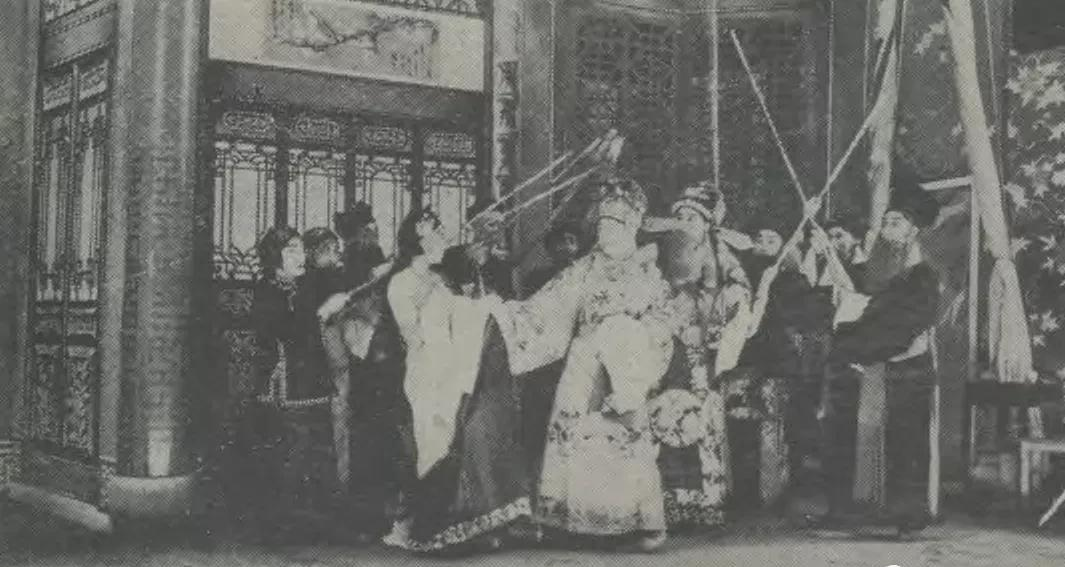<h1 class="pgc-h-arrow-right" data-track="1" > please pay attention to the "Liyuan Magazine" WeChat public account. How to follow: Open WeChat, search for "Liyuan Magazine" or "Liyuan Magazine" in the WeChat search box, find the Liyuan Magazine public account, enter click to follow, and browse more wonderful content. </h1>
Author: Pan Xiafeng
Before liberation, the sectarian ideology in the Peking Opera circle was serious, and the view of the portal was very deep. As a result, two major art schools appeared on the Peking Opera stage, "Beijing School" and "Hai School".
The "Jingpai", also known as the "Jing Dynasty Faction", centers on Beijing and regards itself as orthodox. There is contempt for the "Hai faction" and the meaning of being thin, and in the conversation, the "Waijiang faction" is long and the "Waijiang faction" is short, and sometimes the language is sarcastic. The "Shanghai School" (also known as the "Waijiang School") is relative to the "Beijing School", which is centered on "Shanghai" and has its own genre in terms of performing arts.
How did the "Haipai" come into being? In the late 1920s and early 1930s, after Shanghai became the economic center of the country, Peking Opera also flourished in Shanghai! The commercialized city of Shanghai naturally has a much greater degree of colonization than the old capital of successive feudal dynasties.
At that time, the social situation in Shanghai was that there were many concessions, many foreigners, many imported products, casino dance halls, clothing, food, and all of them added a bit of "foreign" atmosphere, and on the surface, they were much more "enlightened" than the ancient "Beijing". In this adventurer's paradise, the Peking Opera Banshe, which is based in Shanghai, cannot be unaffected by it!

Zhou Xinfang and Wang Xichun's "Wen Suchen"
Some of the larger theaters are controlled by those compradors and hooligans, the acting is exclusively for the purpose of making profits, some of the plays performed by the Peking Opera Class Society have to be "new" and "different" day by day, and most of the so-called "new plays" they have choreographed are not quasi-programs and shoddy things, especially those randomly patchworked stage plays, which are called for bizarre and changing organ sets, so the plot of the gods and monster martial arts, the thrilling and complicated martial arts, and the strange costumes have greatly broken through the rules of Peking Opera, and at that time, the "Beijing Dynasty Faction" was used as a "Beijing Dynasty School" The self-styled Peking Opera performance artists looked unpleasant and denounced them as "Hai Pai".
To be fair, the Beijing and Hai factions have their own advantages and disadvantages, and there are many masters of art in both the north and the south.
In the north, there were "Four Famous Dans" and "Four Great Su Shengs"; in the south, there were also performance artists such as "Old Sanmazi" (Wang Hongshou), "Qilin Tong" (Zhou Xinfang), and "Gai Mingtian" (Zhang Yingjie).
The advantages of the "Beijing School" are: attaching importance to the exercise of basic skills, strictly paying attention to the regularity of performing arts, and making great contributions to preserving heritage and inheriting traditions.
Pan Xueyan's four "List of Conferred Gods"
However, since the end of the Qing Dynasty was gradually formed, it has been influenced by other local dramas, enriching the techniques of "singing" and performance, especially the wonderful martial arts "mid-turn" and "fighting", which are more than other dramas. This is all the fine tradition of the Beijing school. These characteristics were further developed after liberation.
The disadvantages are: because of the deep influence of feudal thought, the artistic conformist ideas are more serious, and they are slow to accept new things, but after liberation, this conservative thinking has been gradually eliminated.
Shanghai Playground "Hollywood Paradise"
Although the "Haipai" has superficial, vulgar, and flashy shortcomings, it also has the advantages of being bold in innovation, being good at creating, and daring to accept new things, and after liberation, the advantages of the "Haipai" have been carried forward, and the vicious development of capitalist commercialization has been eradicated. The strict barriers between the "Beijing" and "Hai" factions no longer exist. The artistic exchanges between the artists of the North and the South have further developed the performing arts of Peking Opera.
(Peking Opera Art Q&A)